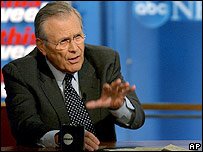Despite my tight-lippedness, the USFK personnel—particularly soldiers themselves—often bring things up themselves.
In 2004, most of the people (roughly a two-to-one majority) I knew were mostly in support of Bush, but there were some people I knew who could get a little outspoken about their criticisms of the war—particularly about why we went in in the first place and/or how it was being handled.
Frankly, I was surprised that anyone in uniform would say anything negative about the war. If AFN (American Forces Network) info spots are to be believed, this is a big no-no, potentially a court-martialable offense.
But as time went on, the two-to-one gradually slipped to one-to-one, and the critics became even more and more outspoken. Sometimes I couldn't get them to shut up.
My own views are along the lines that we are in a you-broke-it-you-bought-it situation, making a quick pull-out the wrong thing to do. I haven't really met any who thinks we need to get out now, but I hear a lot of people telling me they think that the war has been mishandled for the most part. And it scares some of them. I guess it's one thing to get shot at while fighting for a good cause, but something entirely different when you're getting shot at due to incompetent decisions from the leadership.
At any rate, it really didn't come as any surprise to me that six retired generals have spoken out against Defense Secretary Donald Rumsfeld's handling of the war in Iraq and, as the BBC describes it, apparent disdain for experienced military commanders. From the BBC:
In a radio interview Gen Riggs, a former division commander, said it was time for Mr Rumsfeld to go because he fostered an atmosphere of "arrogance" among the Pentagon's top civilian leadership.The six retired generals who have chosen to spoke out recently are Army Major General Charles H. Swannack Jr., Army Major General John Riggs, Army Major General John Batiste, Marine General Anthony Zinni, Marine Lt. General Gregory Newbold, and Army Major General Paul Eaton. Some of these are names you may recognize from the news, such as Zinni, Riggs, and Batiste.
"They only need the military advice when it satisfies their agenda. I think that's a mistake, and that's why I think he should resign," he told National Public Radio (NPR).
On the other hand, if what is often said about President George W. Bush's leadership is to be believed, it doesn't really surprise me that Bush has assured Rumsfeld of his "full support" in the wake of that criticism.
While Bush praised Rumsfeld for his "energetic and steady leadership" during his years at the Pentagon, Rumsfeld fired back at his attackers, telling Arabic TV channel al-Arabiya:
Out of thousands and thousands of admirals and generals, if every time two or three people disagreed we changed the secretary of defense of the United States it would be like a merry-go-round.My first thought on reading this was, are there really thousands and thousands of admirals and generals in the US military, retired or still serving? My second thought was that these "two or three people" (actually, six) who were heavily involved in the US military effort in Iraq may represent a sizable portion of the military brass involved in the war over there (though theirs might still be a minority opinion).
 Rumsfeld twice offered to resign in the wake of the 2004 uproar over the Abu Ghraib prison scandal, but Bush refused to accept. He stressed that under Rumsfeld's guidance, the US military has undergone a period of rapid transformation and faced a series of major overseas conflicts.
Rumsfeld twice offered to resign in the wake of the 2004 uproar over the Abu Ghraib prison scandal, but Bush refused to accept. He stressed that under Rumsfeld's guidance, the US military has undergone a period of rapid transformation and faced a series of major overseas conflicts.Naturally, Democrats have seized on Bush's statement of support, comparing them with the praise he gave to former FEMA head Michael Brown over his handling of the Hurricane Katrina aftermath. Despite Bush's statements of support, Brown was forced out of office after harsh criticism of the government's response to the disaster.
Rumsfeld is not without supporters in the military. According to the BBC report, retired Marine Lt. General Mike DeLong, who was deputy commander of Central Command as the US military prepared to invade Iraq in March 2003, has said Rumsfeld was good at his job.
No comments:
Post a Comment
Share your thoughts, but please be kind and respectful. My mom reads this blog.